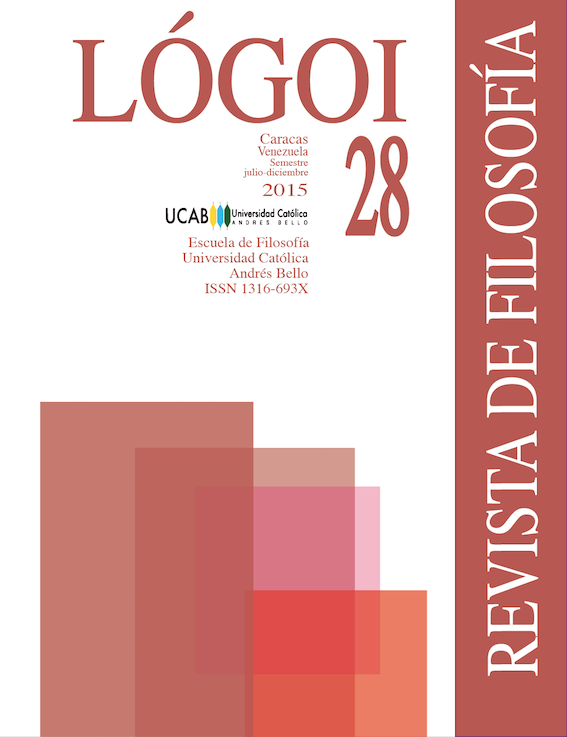Argumentative dialogic forms: A heuristic argumentative system
DOI:
https://doi.org/10.62876/lr.v0i28.3318Keywords:
Arguments, argument evaluation, argumentative attack, unique status focus, esceptic semanticsAbstract
In this paper we introduce some elements of a heuristic argumentation system. The system can be called heuristic because it is grounded on a set of local relations (based on cooperation and attack relations). Those local relations are called argumentative dialogic forms. In this work, we consider three attack relations (rebutting, undercutting, and undermining attacks) and one cooperative relation (subordinate relation). We establish a set of evaluation rules for the argumentative forms, following a strategy of assignment of unique status named the strong skeptical semantics.
Downloads
References
Bart Verheij: “The Toulmin Argument Model in Artificial Intelligence Or: how semi-formal, defeasible argumentation schemes creep into logic”, pp. 219-238, Iyad Rahwan y Guillermo R. Simari (eds.): Argumentation in Artificial Intelligence, Dordrecht, New York, Springer, 2009.
Charlotte S. Vlek, Henry Prakken, Silja Renooij, Bart Verheij: “Building Bayesian networks for legal evidence with narratives: a case study evaluation”, pp 375–421, Artificial Intelligence and Law 22, 2014.
Douglas Walton: Argumentation schemes for presumptive reasoning, New Jersey, Lawrence Erlbaum Associates, 1996.
Eduardo Piacenza: “Audiatur et altera pars!”, pp. 177-203, Revista de Derecho, nº 2, Caracas, Tribunal Supremo de Justicia, 2000.
Eduardo Piacenza: “Las relaciones interargumentales en la evaluación de las argumentaciones judiciales”, ponencia no publicada, VI Congreso Nacional de Filosofía, Universidad Católica Andrés Bello - Núcleo Guayana, 2005.
Frans van Eemeren, Bart Garssen, Erik. C. W. Krabbe, A. Francisca Snoeck Henkemans, Bart Verheij & Jean H. M. Wagemans: Handbook of Argumentation Theory, p. 12. Springer Science + Business Media Dordrecht, 2014.
Gerard, Abstract argumentation systems, p. 236, 1997.
Hage, Jaap: “Theory of Legal Reasoning and a Logic to Match”, pp. 199- 273, Artificial Intelligence and Law, 4, 1996.
Henry Prakken y Gerard Vreeswijk: “Logics for defeasible argumentation”, pp. 219-318, Dov Gabbay y F Guenthner (eds.): Handbook of Philosophical Logic, 2ª edic, 4, Kluwer Academic Publishers, Dordrecht, 2002.
Henry Prakken, Bart Verheij: Rules, reasons, arguments: formal studies of argumentation and defeat. Doctoral Dissertation, University of Maastricht, 1996.
Iyad Rahwan y Guillermo R. Simari (eds.): Argumentation in Artificial Intelligence, Dordrecht, New York, Springer, 2009.
John Pollock: “Recursive Semantics for Defeasible Reasoning”, pp. 173-198, Iyad Rahwan y Guillermo R. Simari (eds.), Argumentation in Artificial Intelligence, Dordrecht, New York, Springer, 2009.
John Pollock: “Justification and defeat”, p. 380, Artificial Intelligence, 67, 1994.
John Pollock: “Defeasible reasoning”, pp. 481–518, Cognitive Science, no11, 1987.
John Pollock, How to reason defeasibly, 7, 1992; Pollock, John, Cognitive Carpentry …63-64, 1995; y John Horty: “Defaults with priorities”, pp. 367- 413, Journal of Philosophical Logic, 36, 2007.
Luis A. Malavé Naime: “Sistema evaluativo de argumentación a partir de las reglas propuestas por Eduardo Piacenza”, pp. 57-84, Lógoi, 21, 2012.
Luis A. Malavé Naime: “Formalización y análisis de las relaciones interargumentales coadyuvantes paralelas”, pp. 1-21, Revista Iberoamericana de Argumentación, 9, 2014.
Luis A. Malavé Naime: “Inteligencia Artificial, In Dubio Pro Reo y Presunción de Inocencia. Modelando principios del juicio penal mediante un sistema argumentativo”, pp. 131-156, Doxa, Cuadernos de Filosofía del Derecho, Alicante, España, 2015.
Mogdil, Sanjay y Prakken, Henry. A general account…, p.5. 2013.
Paul E. Dunne y Michael Wooldridge: “Complexity of Abstract Argumentation”, pp. 85-104, Iyad Rahwan y Guillermo R. Simari (eds.): Argumentation in Artificial Intelligence, Dordrecht, New York, Springer. 2009.
Paul E. Dunne y Trevor J. M. Bench-Capon (eds.): Computational Models of Argument: Proceedings of COMMA, 2006.
Phan M. Dung: “On the acceptability of arguments and its fundamental role in nonmonotonic reasoning, logic programming, and n–person games”, pp. 321–357, Artificial Intelligence, 77, 1995.
Pietro Baroni y Massimiliano Giacomini: “Semantics of Abstract Argument Systems”, p.32, Iyad Rahwan y Guillermo R. Simari (eds.): Argumentation in Artificial Intelligence, Dordrecht, New York, Springer, 2009.
Raymond Reiter y Giovanni Criscuolo: “On interacting defaults”, p. 274. Proceedings of the Seventh International Joint Conference on Artificial Intelligence (IJCAI'81), 1981.
Sanjay Modgil y Henry Prakken: “A general account of argumentation with preferences”, pp. 361-397, Artificial Intelligence, 195, 2013.
Sanjay Modgil y Henry Prakken: “The ASPIC+ framework for structured argumentation: a tutorial”, pp. 31-62, Argument and Computation, 5, 2014.
Sanjay Modgil, Henry Prakken y Douglas Walton: “The Carneades model of argument and burden of proof”, pp. 875-896, 1992.
Sanjay Modgil, Henry Prakken y Douglas Walton: “Proof Burden and Standards”, pp. 239-258, Iyad Rahwan y Guillermo R. Simari (eds.): Argumentation in Artificial Intelligence, Dordrecht, New York, Springer, 2009.
Silja Renooij, Charlotte S. Vlek, Bart Verheij: “The Carneades model evaluated”, pp. 195-206, J. van Benthem et al. (eds.), Logic in the Twenty-First Century, Amsterdam University Press, 2016.
Thomas Gordon y Douglas Walton: “The Carneades Argumentation Framework: Using Presumptions and Exceptions to Model Critical Questions”, pp. 95-207, Paul E. Dunne y Trevor J. M. Bench-Capon (eds.): Computational Models of Argument: Proceedings of COMMA, 2006.
Published
How to Cite
Issue
Section
License
Copyright (c) 2022 Array

This work is licensed under a Creative Commons Attribution-NonCommercial-ShareAlike 4.0 International License.






.png)












